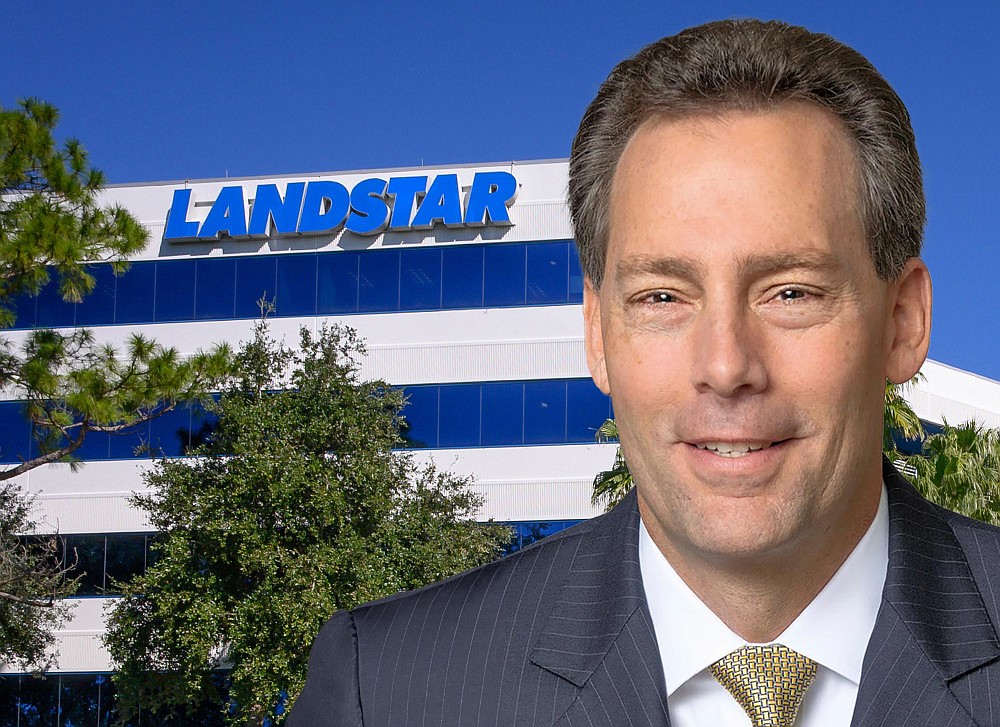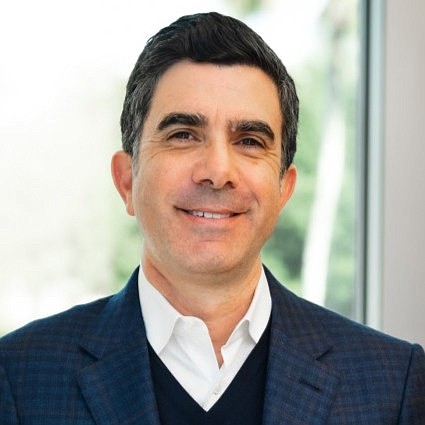
Landstar System Inc. is going outside the company for its new CEO, a surprising move for the Jacksonville-based trucking company, based on its past.
Landstar has only had three chief executives in its 35-year history and in its previous two changes, it promoted longtime company executives into the CEO role.
However, the transition to new CEO Frank Lonegro is not expected to change the direction of Landstar, which has had a generally successful run since it was formed in 1988 and went public in 1993.
Landstar announced Dec. 4 that James Gattoni, CEO since the end of 2014, will retire in February and be succeeded by former CSX Corp. executive Lonegro.
Gattoni has been with Landstar since 1995 and he succeeded Henry Gerkens, who had been with the company since it was founded in 1988 and became CEO in July 2004.
Gerkens succeeded company founder Jeffrey Crowe in the role.
Crowe presided over the company as it went public and then moved its corporate headquarters from Shelton, Connecticut, to Jacksonville in mid-1997.
“Gattoni has been at the helm since 2014 and the firm’s execution under his watch has been impressive,” Morningstar analyst Matthew Young said in a Dec. 5 research note.
“Landstar’s returns on capital comfortably exceeded 30% over the past decade and its stock price has almost tripled,” he said.
Actually, the stock has been good to shareholders through all three chief executives.
The stock has been trading close to $180 recently after topping $200 earlier this year, more than 100 times its split-adjusted IPO price of about $1.60 in March 1993.
By comparison, the Dow Jones Industrial Average is about 10 times its 1993 level.
“At this point, we are expecting a relatively smooth transition and do not anticipate any major near-term changes to Landstar’s unique agent-based truck brokerage operating model,” Young said.
In Landstar’s model, the company does not own trucks but contracts with drivers who own their trucks to transport freight across the country.
It has been successful enough to make Landstar a Fortune 500 company with 2022 revenue of $7.44 billion.
However, Landstar will likely drop out of the Fortune 500 next year, as a slump in freight traffic is projected to drop its 2023 revenue to about $5.3 billion.
That trend is likely to continue in 2024. J.P. Morgan analyst Brian Ossenbeck initiated coverage of Landstar with a “neutral” rating Dec. 11, saying he doesn’t see an increase in the spot rates shippers pay the company coming quickly enough.
“We believe this setup limits the near-term upside for Landstar and merits a Neutral rating but we recognize the company is uniquely positioned to benefit from a truckload rate recovery given its high exposure to spot truckload rates and margin structure,” Ossenbeck said in his report.
He is projecting 2024 revenue of $5.4 billion for the company.
Ossenbeck also covers Jacksonville-based CSX so he is familiar with Lonegro, who spent 19 years with the railroad company before leaving in May 2019.
“We do not anticipate any material changes to Landstar’s strategy or priorities under his leadership,” Ossenbeck said.
Lonegro has been in a different industry as CFO of Beacon Roofing Supply Inc. since 2000, but Young said his previous work at CSX should have him prepared to take over at Landstar.
“This experience gives us confidence that he is familiar with the freight markets and is a seasoned, capable leader,” he said.
In addition to the leadership transition, Landstar also announced for the fifth straight December it will pay a special dividend to shareholders.
The company will pay a one-time $2-per-share dividend in January. That’s in addition to its regular quarterly dividend, which was increased from 30 cents to 33 cents a share in July.
“Landstar’s strong balance sheet and free cash flow generation enable us to continue to return value to our stockholders,” Gattoni said in a news release.
The company also announced an increase in the amount of shares it may buy under its repurchase program, which reduces the number of shares available in the market and makes the remaining shares more valuable.
The company has been repurchasing shares for years.
“Landstar’s asset-light operating model has helped fuel a buyback program that steadily reduced share count by about 40% over the last 20 years,” Ossenbeck said.
“The stock’s total return profile is further bolstered by a consistently growing dividend and now includes an increasingly regular ‘special’ dividend,” he said.
Landstar said it bought back about $54 million in stock in the first 11 months of this year and paid $117 million in cash dividends to shareholders.
The company had $497 million in cash and short-term investments on its balance sheet at the end of the third quarter.
Johnson & Johnson Vision is the global leader in contact lens sales and as the market for vision correction continues to expand, the Jacksonville-based company expects to grow faster than the market.
“There are more than 2 billion people around the world that need vision correction and this number continues to rise every year due to an aging population and digital lifestyle trends,” Vision Group Chairman Peter Menziuso said at a Johnson & Johnson investor presentation Dec. 5.
“As a result, the vision market is growing at 5 to 7% annually, with an estimated value of $20 billion by 2027,” Menziuso said at the event at the New York Stock Exchange.

“We’re growing faster than the market today and we expect to continue to do so with our differentiated innovation,” he said.
Medical products giant Johnson & Johnson has been in the contact lens business since it acquired a Jacksonville company called Frontier Contact Lenses in 1981.
It expanded the vision business beginning in 2016 by acquiring companies that make products for cataract surgery.
Menziuso said Johnson & Johnson is second in the market for intraocular lenses, or IOLs.
An IOL is an artificial lens implanted to replace the eye’s natural lens in cataract surgery, and the company sees a big market opportunity in that business.
“Only 10 to 15% of people (having cataract surgery) are getting advanced optical IOLs, specifically designed for astigmatism and presbyopia,” Menziuso said.
The cataract products are made elsewhere but Johnson & Johnson continues to produce contact lenses at its Deerwood Park campus in Jacksonville that employs about 4,200 people, including contractors.
Menziuso said about 120 million people wear soft contact lenses, but that’s only 10% of prospective wearers, so there is room for growth in that business.
Contact lenses are a $10 billion market today and that is expected to grow to $13 billion by 2027, he said.
Johnson & Johnson reported $2.8 billion in contact lens sales in the first nine months of this year, and the surgical vision products division added $1 billion in sales.
“Our portfolio spans the lifetime of sight,” Menziuso said.
“We are well positioned to be the world’s leader in eye health.”
In what was likely its final earnings report, Patriot Transportation Holding Inc. reported higher operating earnings and revenue for the fiscal year ended Sept. 30.
The Jacksonville-based trucking company agreed Nov. 1 to a $66 million buyout offer from Oklahoma City-based United Petroleum Transports Inc.
Shareholders are scheduled to vote on the offer Dec. 19, and the deal is expected to be completed by the end of this year or in early 2024.
Patriot reported earnings Dec. 6 of $2.7 million, or 74 cents, for the year.
The company had fiscal 2022 earnings of $7.2 million, or $1.98 a share, but that included $6.3 million in net gains from real estate sales.
Revenue rose 7.9% to $94.8 million in fiscal 2023.
Patriot did not hold a conference call to discuss earnings because of the pending buyout.
Mercer Global Advisors Inc. announced Dec. 5 it acquired Jacksonville-based Paragon Wealth Strategies LLC.
Paragon is a wealth management firm founded by managing partners Jonathan Castle and Michelle Ash in 2008.
Denver-based Mercer is a wealth management and financial planning firm with 80 offices throughout the U.S.
“We were looking to join a national firm that added not only scale and additional support for our team, but also added new services that we could share with our clients,” Ash said in a news release.
Mercer said the addition of Paragon bolsters its Florida presence.
Terms of the deal were not announced.
ComSovereign Holding Corp. filed its annual report for 2022 on Dec. 7, but the communications technology company has still not filed its reports for the first three quarters of 2023.
The company has previously said it received a notice from the Nasdaq Listing Qualifications Staff indicating its stock could be delisted for not filing its scheduled reports.
ComSovereign said it will present its plan to regain compliance to Nasdaq in a hearing.
The Tucson, Arizona-based company was created in late 2019 by the merger of Jacksonville-based Drone Aviation Holding Corp. and ComSovereign Corp.
Its Drone Aviation subsidiary continues to be headquartered in Jacksonville. Besides the tethered drone business, it also operates telecommunications subsidiaries.
However, ComSovereign’s annual report lists Drone Aviation as a “noncore” business as it realigns operations.
In a Dec. 7 news release, ComSovereign CEO David Knight said the company has been working on reorganizing 16 operating units into “a single, focused and unified reporting entity.”
He also said he would update shareholders on the company’s progress early next year.